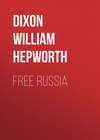Kitabı oku: «Free Russia», sayfa 20
CHAPTER XLIII.
EXILE
A week before the last rising of the Poles took place, an officer of high rank in the Russian service came in the dead of night, and wrapped in a great fur cloak, to a friend of mine living in St. Petersburg, with whom he had little more than a passing acquaintance —
"I am going out," he said, "and I have come to ask a favor and say good-bye."
"Going out!"
"Yes," said his visitor. "My commission is signed, my post is marked. Next week you will hear strange news."
"Good God!" cried my friend; "think better of it. You, an officer of state, attached to the ministry of war!"
"I am a Pole, and my country calls me. You, a stranger, can not feel with the passions burning in my heart. I know that by quitting the service I disgrace my general; that the Government will call me a deserter; that if we fail, I shall be deemed unworthy of a soldier's death. All this I know, yet go I must."
"But your wife – and married one year!"
"She will be safe. I have asked for three months' leave. Our passes have been signed; in a week she will be lodged in Paris with our friends. You are English; that is the reason why I seek you. In the drojki at your door is a box; it is full of coin. I want to leave this box with you; to be given up only in case we fail; and then to a man who will come to you and make this sign. I need not tell you that the money is all my own, and that the charge of it will not compromise you, since it is sacred to charity, and not to be used for war."
"It is a part, I suppose," said my friend, "of your Siberian fund?"
"It is," said the soldier; "you will accept my trust?"
The box was left; the soldier went his way. In less than a week the revolt broke out in many places; slight collisions took place, and the Poles, under various leaders, met with the success which always attends surprise. Three or four names, till then unknown, began to attract the public eye; but the name of my friend's midnight visitor was not amongst them. General – grew into sudden fame; his rapid march, his dashing onset, his daily victory, alarmed the Russian court, until a very strong corps was ordered to be massed against him. Then he was crushed; some said he was slain. One night, my friend was seated in his chamber, reading an account of this action in a journal, when his servant came into the room with a card, on which was printed:
The Countess R –
The lady was below, and begged to see my friend that night. Her name was strange to him; but he went out into the passage, where he found a pale, slim lady of middle age, attired in the deepest black.
"I have come to you," she said at once, "on a work of charity. A young soldier crawled to my house from the field of battle, so slashed and shot that we expected him to die that night. He was a patriot; and his papers showed that he was the young General – . He lived through the night, but wandered in his mind. He spoke much of Marie; perhaps she is his wife. By daylight he was tracked, and carried from my house; but ere he was dragged away, he gave me this card, and with the look of a dying man, implored me to place it in your hands."
"You have brought it yourself from Poland?"
"I am a sufferer too," she said; "no time could be lost; in three days I am here."
"You knew him in other days?"
"No; never. He was miserable, and I wished to help him. I have not learned his actual name."
Glancing at the card, my friend saw that it contained nothing but his own name and address written in English letters; as it might be:
George Herbert,
Sergie Street,
St. Petersburg.
He knew the handwriting. "Gracious heavens!" he exclaimed, "was this card given to you by General – ?"
"It was."
In half an hour my friend was closeted with a man who might intervene with some small hope. The minister of war was reached. Surprised and grieved at the news conveyed to him, the minister said he would see what could be done. "General Mouravieff," he explained, "is stern, his power unlimited; and my poor adjutant was taken on the field. Deserter, rebel – what can be urged in arrest of death?" In truth, he had no time to plead, for Mouravieff's next dispatch from Poland gave an account of the execution of General – by the rope. On my friend calling at the war-office to hear if any thing could be done, he was told the story by a sign.
"Can you tell me," inquired the minister, "under what name my second adjutant is in the field? He also is missing." The caller could not help a smile. "You are thinking," said the minister, "that this Polish revolt was organized in my office? You are not far wrong."
Archangel, Caucasus, Siberia – every frontier of the empire had her batch of hapless prisoners to receive. The present reign has seen the system of sending men to the frontiers much relaxed; and the public works of Archangel occupied, for a time, the place once held in the public mind by the Siberian mines. Not that the Asiatic waste has been abandoned as an imperial Cayenne. Many great criminals, and some unhappy politicians, are still sent over the Ural heights; but the system has been much relaxed of late, and the name of Siberia is no longer that word of fear which once appalled the imagination like a living death. It is no uncommon thing to meet bands of young fellows going up the Ural slopes from Mesen and Archangel, in search of fortune; going over into Siberia as into a promised land!
Many of the terrors which served to shroud Siberia in a pall have been swept away by science. The country has been opened up. The tribes have become better known. Tomsk, a name at which the blood ran cold, is seen to be a pleasant town, lying in a green valley at the foot of a noble range of heights. It is not far from Perm, which may be regarded as a distant suburb of Kazan. The tracks have been laid down, and in a few months a railroad will be made from Perm to Tomsk.
The world, too, has begun to see that a penal settlement has, at best, a limited lease of life. A man will make his home anywhere, and when a place has become his home, it must have already ceased to be his jail. It is in the nature of every penal settlement to become unsafe in time; and a province of Siberia, peopled by Poles, would be a vast embarrassment to the empire, a second Poland in her rear. Even now, long heads are counting the years when the sons of political exiles will occupy all the leading posts in Asia. Will they not plant in that region the seeds of a Polish power, and of a Catholic Church? It is the opinion of liberal Russians that Siberia will one day serve their country as England is served by the United States.
The exiles sent to the frontiers are of many kinds; noble, ignoble; clerical, lay; political offenders, cut-throats, heretics, coiners, schismatics; prisoners of the Court, prisoners of the Law, and prisoners of the Church. The exiles sent away by a minister of police, by the governor of a province, are not kept in jail, are not compelled to work. The police has charge of them in a certain sense; they are numbered, and registered in books; and they have to report themselves at head-quarters from time to time. Beyond these limits they are free. You meet them in society; and if you guess they are exiles, it is mainly on account of their keener intelligence and their greater reserve of words. They either live on their private means, or follow the professions to which they have been trained. Some teach music and languages, some practise medicine or law; still more become secretaries and clerks to the official Russ. A great many occupy offices in the village system. In one day's drive in a tarantass I saw a dozen hamlets, in which every man serving as a justice of the peace was a Pole.
Not less than three thousand of the insurgents taken with arms in their hands during the last rising at Warsaw, were sent on to Archangel. At first the number was so great that an insurrection of prisoners threatened the safety of the town. The governor had to call in troops from the surrounding country, and the war-office had to fetch back all the Prussian and Austrian Poles whom, in the first hours of repression, they had hurried to the confines of the Frozen Sea.
They lived in a great yellow building, once used as the arsenal of Archangel, before the Government works were carried to the South; and their lot, though hard enough, was not harder than that of the people amongst whom they lived. They were gently used by the officers, who felt a soldierly respect for their courage, and a committee of foreign residents was allowed to visit them in their rooms. The food allowed to them was plentiful and good, and many a poor sentinel standing with his musket in their doorways must have envied them the abundance of bread and soup.
In squads and companies these prisoners have been brought back to their homes; some to their families, others to the provinces in which they had lived. Many have been freed without terms; some have been suffered to return to Poland on the sole condition of their not going to Warsaw. A hundred, perhaps, remain in the arsenal building, waiting for their turn to march. Their lot is hard, no doubt; but where is the country in which the lot of a political prisoner is not hard? Is it Virginia? is it Ireland? is it France?
These prisoners are closely watched, and the chances of escape are faint; not one adventurer getting off in a dozen years. A Pole of desperate spirit, who had been sent to Mesen as a place of greater security than the open city of Archangel, slipped his guard, crawled through the pine woods to the sea, hid himself in the forest, until he found an opportunity of stealing a fisherman's boat, and then pushed boldly from the shore in his tiny craft, in the hope of being picked up by some English or Swedish ship on her outward voyage. Four days and nights he lived on the open sea; suffering from chill and damp, and torn by the pangs of hunger and thirst, until the paddle dropped from his hands. His strength being spent, he drifted with the tide on shore, only too glad to exchange his liberty for bread. When the officer sent to make inquiries drove into Mesen, he found the poor fellow lying half dead in the convict ward.
Beyond this confinement in a bleak and distant land, the Polish insurgents do not seem to be physically ill-used. Their tasks are light, their pay is higher than that of the soldiers guarding them, and some of the better class are allowed to work in cities as messengers and clerks. At one time they were allowed to teach – one man dancing, a second drawing, a third languages; but this privilege has been taken from them on the ground that in the exercise of these arts they were received into families, and abused their trust.
It is no easy thing to mix these Polish malcontents with the general race, without producing these results which a jealous police regard as a "corruption" of youth.
Man for man, a Pole is better taught than a Russian. He has more ideas, more invention, more practical talent. Having more resources, he can not be thrown in the midst of his fellows without taking the lead. He can put their wishes into words, and show them how to act. A prisoner, he becomes a clerk: an exile, he becomes on overseer, a teacher – in fact, a leader of men. Sent out into a distant province, he gradually but surely asserts his rank. An order from the police can not rob him of his genius; and when the ban is taken from his name, he may remain as a citizen in the town which gives him a career and perhaps supplies him with a wife. He may get a professor's chair; he may be made a judge; if he has been a soldier, he may be put on the general's staff.
All this time, and through all these changes, he may hold on to his hope; continuing to be a Pole at heart, and cherishing the dream of independence which has proved his bane. The country that employs him in her service is not sure of him. In her hour of trial he may betray her to an enemy; he may use the power in which she clothes him to deal her a mortal blow. She can not trust him. She fears his tact, his suppleness, his capacity for work. In fact, she can neither get on with him nor without him.
In the mean time, Poles who have passed through years of exile into a second freedom are coming to be known as a class apart, with qualities and virtues of their own – the growth of suffering and experience acting on a sensitive and poetic frame. These men are known as the Siberians. A Pole with whom I travel some days is one of these Siberians, and from his lips I hear another side of this strange story of exile life.
CHAPTER XLIV.
THE SIBERIANS
"He is one of the Siberians," says my comrade of the road, after quoting some verses from a Polish poet.
"One of the Siberians?"
"Yes," replies the Pole. "In these countries you find a people of whom the world has scarcely heard; a new people, I might say; for, while in physique they are like the fighting men who followed Sobieski to the walls of Vienna, they are in mind akin to the patient and laborious monks who have built up the shrines of Solovetsk. Time has done his work upon them. A sad and sober folk, they go among us by the name of our Siberians."
"They are Poles by birth?"
"Yes, Poles by genius and by birth. They are our children who have passed through fire; our children whom we never hoped to see in the living world. Once they were called our Lost Ones. In Poland we have a tragic phrase, much used by parting friends: 'We never meet again!' For many years that parting phrase was fate. An exile, sent beyond the Ural Mountains, never came back; he was said to have joined our Lost Ones; he became to us a memory like the dead. We could not hope to see his face again, except in dreams. To-day that line is but a song, a recollection of the past; a refrain sung by the waters of Babylon. In Vilna, in Kazan, in Kief, in a hundred cities widely parted from each other, you will find a colony of Poles, now happy in their homes, who have crossed and recrossed those heights; men of high birth, and of higher culture than their birth; men who have ploughed through the snows of Tomsk; who have brought back into the West a pure and bruised, though not a broken spirit."
"Are these pardoned men reconciled to the Emperor?"
"They are reconciled to God. Do not mistake me. No one doubts that the reigning Emperor is a good and brave man; high enough to see his duty; strong enough to face it, even though his feet should have to stumble long and often on the rocks. But God is over all, and his Son died for all. Alexander is but an instrument in His hands. You think me mystical! Because my countrymen believe in the higher powers, they are described by Franks, who believe in nothing, as dreamers and spiritualists. We dream our dreams, we see our signs, we practise our religion, we respect our clergy, we obey our God."
"I have heard the Poles described as women in prayer, as gods in battle!"
"Like the young men of my circle," he continues, after a pause, "I took a part in the rising of '48; a poor affair, without the merit of being either Polish or Slavonic. That rising was entirely French. While young in years I had travelled with a comrade in the west of Europe; living on the Rhine, and on the Seine, where we forgot the religion of our mothers and our country, and learned to think and to speak of Poland as of a northern France. We called ourselves republicans, and thought we were great philosophers; but the idol of our fancies was Napoleon the Great, under whose banner so many of our countrymen threw away their lives. We ceased to appear at church, and even denied ourselves to the Polish priest. We hated the Tsar, and we despised the Russians with all our souls. Two years before the republic was proclaimed in the streets of Paris, we returned to Warsaw, in the hope of finding some field of service against the Tsar; but the powers had been too swift for us; and Cracow, the last free city of our country, was incorporated with the kaisar's empire on the day when I was dropped from the tarantass at my father's door. France bade us trust in her, and in the secret meetings which we called among our youthful friends, we gave up the good old Polish psalms and signs for Parisian songs and passwords. In other days we sang 'The Babe in Bethlehem,' but now, inspired with a foreign hope, we rioted through the Marseillaise. We had become strangers in the land, and the hearts of our people were not with us. The women fell away, the clergy looked askance, but the unpopularity of our new devices only made us laugh. We said to ourselves, we could do without these priests and fools; men who were always slaves, and women who were always dupes. As to the crowd of grocers and bakers – we thought of them only with contempt. Who ever heard of a revolution made by chandlers? We were noble, and how could we accept their help? The year of illusion came at length. That France to which every Polish eye was strained, became a republic; and then a troop of revellers, strong enough to whirl through a polka, threw themselves on the Russian guns, and were instantly sabred and shot down. Ridden over in the street, I was carried into a house; and, when my wounds were dressed, was taken to the castle royal, with a hundred others like myself, to await our trial by commission, and our sentence of degradation from nobility, exile to Siberia, and perpetual service in the mines. My friend was with me in the street, and shared my doom."
"Had you to go on foot?"
"Well – no. For Nicolas, though stern in temper, was not a man to break the law. Himself a prince, he felt a proud respect for the rights of birth; and as a noble could not be reduced to march in the gangs like a peddler and a serf, our papers were made out in such a way that our privileges were not to end until we reached Tobolsk. There the permanent commission of Siberia sat; and there each man received his order for the mines. We rode in a light cart, to which three strong ponies were tied with ropes; and when the roads were hard, we made two hundred versts a day. Our feet were chained, so that we could not take off our boots by night or day; but the people of the steppe over which we tore at our topmost speed, were good and kind to us, as they are to exiles; giving us bread, dried fish, and whisky, on the sly. They knew that we were Poles, and, as a rule, their popes are only too much inclined to abuse the Poles as enemies of God; but the Russians, even when they are savages, have a tenderness of heart. They know the difference between a political exile and a thief; for the Government stamps the thief and murderer on the forehead and the two cheeks with a triple vor; a black and ghastly stamp which neither fire nor acid will remove; and if they think a Pole very wicked in being a Catholic they feel for his sufferings as a man. Twice I tried to escape from the mines; and on both occasions, though I failed to get away, the kindness of the poor surprised me. They dared not openly assist my flight, but they were sometimes blind and deaf; and often, when in hunger and despair I ventured to crawl near a cabin in the night, I found a ration of bread and fish, and even a cup of quass, laid ready on the window-ledge."
"Who put them there, and why?"
"Poor peasants, to whom bread and fish are scarce; in order to relieve the wants of some poor devil like myself."
"Then you began to like the people?"
"Like them! To understand them, and to see they were my brothers; but my heart was hard with them for years. I was a man of science, as they call it; and I told myself that in giving food to the hungry they were only obeying the first rude instincts of a savage horde. At length a poor priest came in a cart to the mines. Before his coming I had heard of him – his name – his mission – and his perils; for Father Paul was a free agent in his travels; having chosen this service in the desert snows, instead of a stall in some cathedral-town, from a belief that poor Catholic exiles had a higher claim on him than sleek and fashionable folk. I knew, from the report of others, that he made the round of Siberia, sledging from mine to mine, from mill to mill, in order to keep alive in these Catholic exiles some remembrance of their early faith; to say mass, to hear confessions, to marry and baptize, to sanctify the new-made grave. Yet I hardly gave to him a second thought. What could he do for me; a poor priest, dwelling by choice in a savage waste, with no high sympathies and no great friends? He was not likely to adore Napoleon, and he was certain to detest Mazzini's name. How could I talk with such a man? The night when he arrived was cold, his sledge was injured, and the wolves had been upon his track. Some natural pity for his age and danger drew me to his side in our wooden shed, and after he was thawed into life, he spoke to us, even before he tasted food, of that love of God which was his only strength. When he had supped on our coarse turnip soup and a little black bread, he lay down on a mattress and fell asleep. For hours that night I sat and gazed into his face, his white hair falling on his pillow, and his two arms folded like a cross upon his breast. If ever man looked like an angel in his sleep it was Father Paul. Of such men is the Church of Christ.
"Next day I sought him in his shed, for our inspector turned this visit into a holiday for his Catholic prisoners; and there he spoke to me of my country and of my mother, until my heart was softened, and the tears ran down my face. Pausing softly in his speech, he bent his eyes upon me, as my father might have looked, and pressing me tenderly by the hand, said: 'Come unto me all ye that labor and are heavy laden, and I will give you rest.' 'Blessed are they that mourn; for they shall be comforted. Blessed are the meek; for they shall inherit the earth.' I had read these words a hundred times, for I was fond of the New Testament as a book of democratic texts; but I had never felt their force until they fell from the lips of Father Paul. I saw they were addressed to me. My mother was about me in the air. I laid down my philosophy, and felt once more like a little child."
His voice is low and mellow, but the tones are firm, and touch my ear like strings in perfect tune. After a pause, I asked him how his change of feeling worked in his relations to the Russians.
"A Christian," he replies, "is not a slave of the flesh. His first consideration is for God; his second for the children of God, not as they chance to dwell on the Vistula, on the Alps, on the Frozen Sea, but in every land alike. He yields up the sword to those who will one day perish by the sword. His weapon is the spirit, and he hopes to subdue mankind by love."
"Then you would yield the sword to any one who is proud and prompt enough to seize it."
"No; the sword is God's to give, not mine to yield; and for His purposes He gives it unto whom He will. It is a fearful gift, and no man can be happy in whose grasp it lies."
"Yet many would like to hold it?"
"That is so. The man who first sees fire will burn himself. Observe how differently one thinks of war when one comes to see that men are really the sons of God. All war means killing some one. Which one? Would you like to think that in a future world some awful coil of fate should draw you into slaying an angel?"
"No; assuredly."
"Yet men are angels in a lower stage! We see things as we feel them. Men are blind, until their eyes are opened by the love of God; and God is nearest to the bruised and broken heart. Hosts of Siberians have come back to Poland; but among these exiles there is hardly one who has returned as he went forth."
"They are older."
"They are wiser. Father Paul, and priests like Father Paul – for he is not alone in his devotion – have not toiled in vain. Perhaps I should say they have not lived in vain; for the service which they render to the proud and broken spirit of the exile, is not the word they utter, but the doctrine they live. The poets and critics who have passed through fire are known by their chastened style. They have put away France and the French. They read more serious books; they speak in more sober phrase. In every thing except their love of God and love of country you might think them tame. They preach but little, and they practise much; above all, they look to what is high and noble, if remote, and set their faces sternly against the wanton waste of blood. They know the Russians better, and they did not need the amnesty, and what has followed it, in order to feel the brotherhood of all the Slavonic tribes."
"You are a Panslavonist?"
"No! We want a wider policy and a nobler word. The Panslavonic party has built a wall round Kief, and they would build a wall round Russia. They have a Chinese love of walls. Just look at Moscow; one wall round the Kremlin, a second wall round China-town, a third wall round the city proper. What we need is the old war-cry of St. George – the patron of our early dukes, our free cities, and our missionary church."










